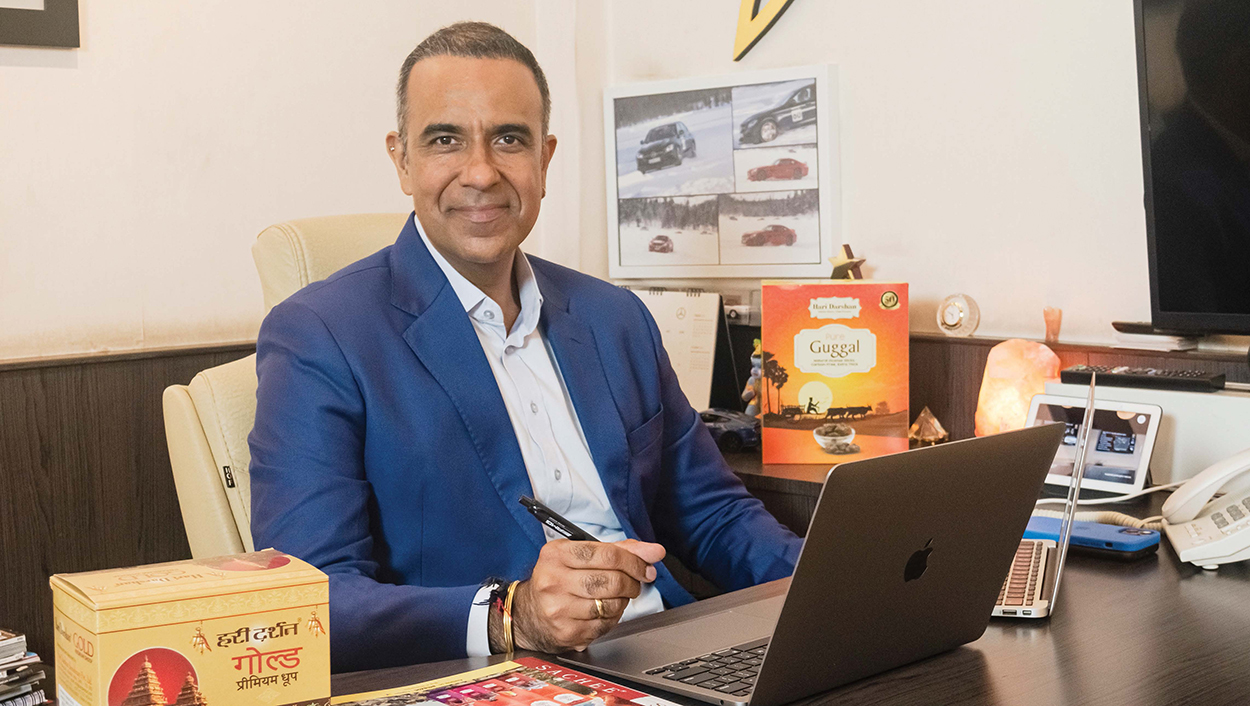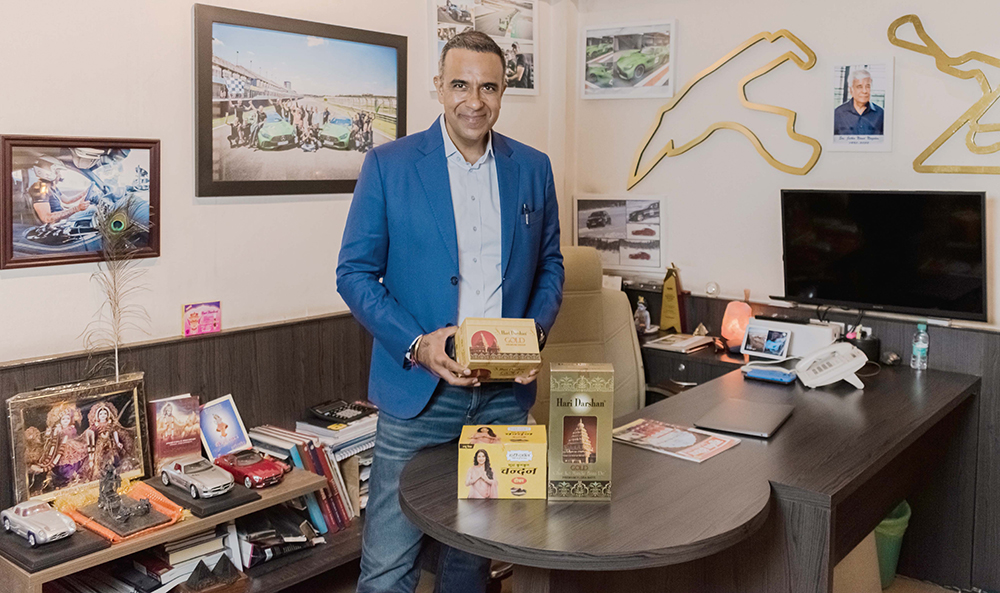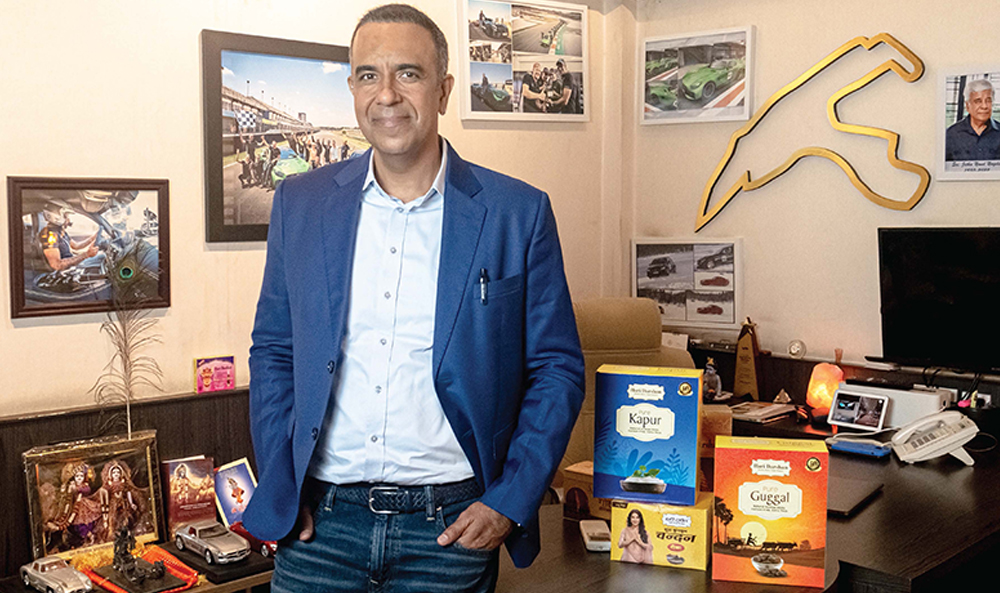
Unity is Vital for Industry – Goldy Nagdev
-Hari Darshan focusing on innovation rather than a countless range of products
Hari Darshan is a well-established name in the incense industry with a huge customer base in the country and abroad. They are one of the earliest in the trade, manufacturing a complete range of dhoop, agarbathis, pooja, spiritual & home fragrance products. For generations, the founding family had been tradersdealing with aromatic herbs, spices and essential oils; going back to the pre independence British rule times.The nation’s independence followed by the partition changed everything for this family and destiny charted a new course. Here’s the story of Hari Darshan.
Goldy Nagdev, head of Hari Darshan in a conversation with Sugandh India talks about the challenges being faced by the incense industry and the on-going market trends. He shared his views regarding the new fragrance trends, changes in product packaging, challenge of &from E-commerce and the ever increasing range of products by numerous players.
From scratch powered byaspirations
According to the family history, Goldy Nagdev’s grandfather came empty-handed from Karachi after the partition in 1947 and settled in Delhi.He struggled &restarted a generations-old family business of trading from Sadar Bazar.
“Initially he started wholesale and distribution of Agarbathis & Dhoop. My father upon joining business started the manufacturing chapter and in late 1960s, he began making dhoop and agarbattis in a small factory. This led to the birth of Hari Darshan brand as we we see today. The business grew under the stewardship of my father Late Sh J N Nagdev, he was the wizard of incense!” remarked Goldy Nagdev, MD of the company.Continuing further he said “, Business has grown steadily from one state to another, gradually covering the entire country with a commitment to quality, innovation, and customer satisfaction. By the 1990s they started exporting to several countries.”
The industry is ever changing
In response to a question about being seen as pioneers in the industry, Goldy modestly explains, “We don’t consider our self a pioneer brand, because this industry is ever changing and something new happens all the time. The fragrance, the packaging, the consumer demand, the raw material prices. everything keeps changing within a matter of every 6 months or a year. Earlier most of the brands came in box packaging, now there is a domination of plastic pouch and zipper packaging. E-commerce totally changed the way consumers bought products. Just like any other industry, the incense industry too keeps changing.”
Goldy believes that wecannot reach the sky as the sky is beyond the limits, its eternal but you can always try to be higher than the previous day. He says, “If you startbelieving you have touched the sky,desire of being higher goes away and you stop growing. It is important we stay grounded & we stay humble”.
Customersare now more aware than ever
The customer is much more aware now as he goes through the pricing and quantity of the product. Everything is also just a Google search away from customer. Currently in the industry the customer is not considered while pricing the product, only the profits of manufacturers and network are taken into consideration. The consumer should also be included in the process. The better approach is, keep the price as per the customer and ensure he gets desired value in terms of quality and quantity. The cost charged to the consumer and the resultant value for them should be primary factor while working out maximum retail price.

Sense of belongingness among customers and shopkeepers
When asked ifonline portals like Amazon and Flipkart are eating away the traditional form of business? Goldy Nagdevdenied this and elaborated that both online and offline channels have their role and importance. It all depends on consumer preference, comfort, and value. When a consumer goes for grocery shopping, along with daily needs, he also buys pooja products. Walking up to the nearest shop and personally buying all the things may give one customer a satisfaction while for other it may be more convenient to buy from an online market place.
The consumers have developed a trust and relationship with their local shopkeepers over the years and this has passed on from generations. While in online shopping there is no interaction with the seller and replacement is either at times not possible or becomes a task. Just like despite the ease offered by ATM cards or online payments methods, people still use cash or visit banks, similarly online and offline shopping will co-exist.
Industry needs unity
On the question regarding the challenges faced by the industry, he said that today the industry has created a big challenge for itself. Growth of a company is synced with growth of industry, it is the same in the dhoop and agarbatti industry. People in this industry have knowledge and experience that has been passed down from generations some over 100 years, but still there is no coordination or communication in productive direction. While competition is a good thing, but everyone has to work together and cooperate for the growth of industry and to face it’s challenges. The unity that exists in the automobile sector, airlines and communication is not visible in this sector. This is a huge challenge and an obstacle in itself.
Customer seeks value for money
Reflecting on various trends in the market he commented, ” Even fly-by-night companies have hundreds of products developed in a matter of months. These products are nothing unique except the labels. The reality is, only around thirty to forty products in the range sell.” “So what does a customer want?” Retorting to his own statement he said “, All a customer wants is a good product with a pleasing fragrance in his or her budget. Brands, packaging, and manufacturers come second.Consumersmainly desire a value for money product. Adding onto his own comment he remarked “I believe the product range should be attractive, practical and in sync with consumer needs.
They say customer taste changes from area to area but I don’t see much depth in this logic. A good value product will break this barrier. ” Adding further he remarked “, in some cases,there is demand ofdifferent types and shapes of packaging in differentareas. For example; A brand in round packing is popular in a certain state and the same brand with the same fragrance is popular in square packaging in another. In some cities; zippers are preferred over pouch packs. This again is more of a reason than research based conclusion.” We collectively have to think above this.



Countless products, a distress factor
On the vast product range by the companies in the industry, he said that instead of solving this problem, we just find a way around. People just blindly follow the market reports. Same products are sold under different brand names in different areas,somewhere its Fancy Rose and somewhere else its called special Gulab. In one marketit sells in a red box with white roses printed while in other it is sold in white box with red roses printed. Somewhere in the pouch, somewhere else in the box and all of this is being done in the name of consumer demand. Whereas a consumer only wants maximum number of sticks in MRP of ₹ 10 for example. Now in such a situation, give it as you want, be it in foil, paper or pouch. All this is being called trend in the industry. On the contrary, if we look at the other FMCG products, the offering is all same across all the cities they are sold eg Maggi. A pack of biscuit of a particular brand is same in Delhi and as well as in Mumbai, but what is happening in dhoop and agarbatti industryis very distressing. I am sure many in industry can relate to this.
Dhoop sales growing but agarbatti still dominates
In response to growing dhoop sales, Goldy Nagdev said that the sale of both dhoop and agarbatti are increasing, butagarbattiis still ahead of dhoop. In some states, dhoop is definitely sold more, but agarbatti consumption pan India is much more. Due to religious reasons, the sales have dhoop have soared. Companies place all of their products in the market . Just like big FMCG brands have all sort products all across the country, some of them sell everywhere while some only sell in limited areas. There can be numerous reasons to this.
From prayer to lifestyle, incense has a diverse usage
On the diverse uses of dhoop and agarbatti in India and around the world, he said that burning dhoop and agarbattiis part of our culture. “These days, I’ve noticed people have again started getting close to religion and motivate their children to pray as well. All religions teach us to pray, thank the Almighty and repent for sins. The concept of prayer is growing all over the world”. Adding to this, he said, “the demand for exports is different. The markets of Sri Lanka, Bangladesh, Nepal, and Pakistan are similar to India. In developed countries, incense sticks are a lifestyle product, so the product offering and demand are different.” he further added, “Hari Darshan productsare exported to South America, North America, Africa and Europe. There were some fluctuations and logistics problem for while due to Covid, but now everything is getting back on track.”
Hari Darshan focusing on innovation
Talking about the future plans& new brands, he clarified “, Hari Darshan has countless brands in; dhoop, agarbatti, cones, havan samagri, sandalwood tika, sambrani, puja diya, jyot batti etc. We don’t want anymore! Rather, we are focusing on innovative products and improving what we already have. We have a way to understand customer requirements. The work has begun. We are exploring new ways to reach out to customers instead of falling into competition which is not wise.”
Goldy Nagdev, beyond business
Mr. Goldy Nagdev in his own word is an entrepreneur, Observer, Thinker, Learner, Traveler, and Motor sports Fanatic.
Even though he is at the helm of a legendary consumer brand, his energy, enthusiasm & ability to take initiatives for the industry is commendable, specially his constant motivation and guidance to young & new entrepreneurs.
Goldy Nagdev is an avid traveller and explorer. He is passionate about motorsports and racing and is a trained pro level racing driver. When not working, Goldy Nagdev likes to read and learn more about cars, watch motorsports or even race cars on a track.
Responding to a question about a racing, he said that when he was growing up, there were not so many facilities or resources. Now that the facilities are there, the time is a barrier. He added,”I am passionate about gaining knowledge about cars and discussing it with people. I also like travelling.” Out of all the cars which is his favorite? “Mercedes”, he responds without a thought



